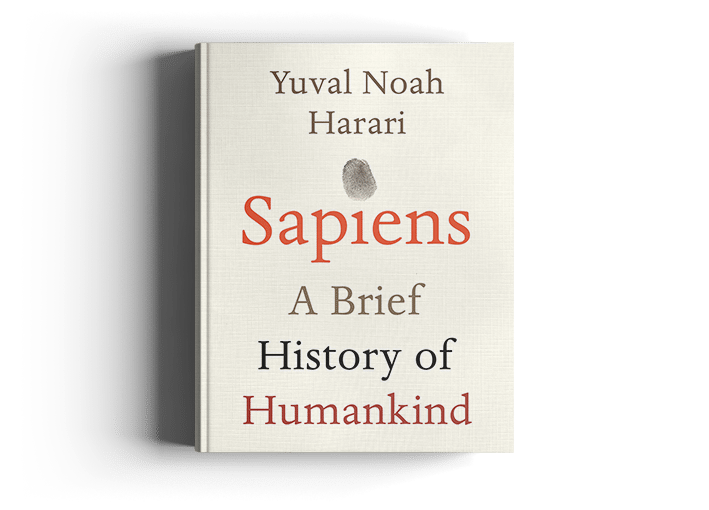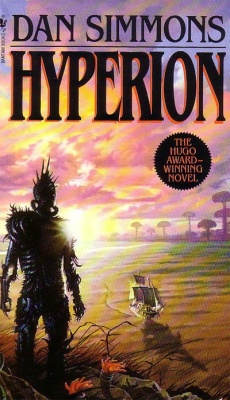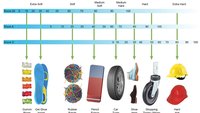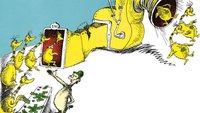I'm currently reading The Every by Dave Eggers (sequel to The Circle), a dystopian novel about society willingly submitting to all-encompassing surveillance by the ultimate tech monopoly. Hilarious and scary at the same time. The protagonist infiltrates the company and tries to seed ridiculous new ideas that push the surveillance over the edge of the acceptable in order to destroy the company from within but each idea is enthusiastically embraced and becomes the new reality.
Books (not Boobs)
Posted by: [email protected]
I'm currently reading The Every by Dave Eggers (sequel to The Circle), a dystopian novel about society willingly submitting to all-encompassing surveillance by the ultimate tech monopoly. Hilarious and scary at the same time. The protagonist infiltrates the company and tries to seed ridiculous new ideas that push the surveillance over the edge of the acceptable in order to destroy the company from within but each idea is enthusiastically embraced and becomes the new reality.
I think we’re closer to that reality than we realize.
Last edited by: Couch_Surfer on Aug. 24, 2022, 11:16 a.m., edited 1 time in total.
Posted by: Couch_Surfer
Posted by: [email protected]
I'm currently reading The Every by Dave Eggers (sequel to The Circle), a dystopian novel about society willingly submitting to all-encompassing surveillance by the ultimate tech monopoly. Hilarious and scary at the same time. The protagonist infiltrates the company and tries to seed ridiculous new ideas that push the surveillance over the edge of the acceptable in order to destroy the company from within but each idea is enthusiastically embraced and becomes the new reality.
I think we’re closer to that reality than we realize.
Yes, that's the scary part. Apparently the author had to scrap some over-the-top ideas because they actually got implemented in reality while he was writing the book.
Posted by: [email protected]
I'm currently reading The Every by Dave Eggers (sequel to The Circle), a dystopian novel about society willingly submitting to all-encompassing surveillance by the ultimate tech monopoly. Hilarious and scary at the same time. The protagonist infiltrates the company and tries to seed ridiculous new ideas that push the surveillance over the edge of the acceptable in order to destroy the company from within but each idea is enthusiastically embraced and becomes the new reality.
Sounds like Q Anon. It could only have started as a dare.
I am fascinated with fishing and fish. Two books I enjoyed recently were Hooked: Pirates, Poaching, and the Perfect Fish by G. Bruce Knecht and Not on My Watch: How a Renegade Whale Biologist Took on Governments and Industry to Save Wild Salmon by Alexandra Morton. Both books were exciting, hard to put down, and invoked an emotional response.
I also read Utopia by Thomas More and found it interesting to imagine reading it in 1516.
I am reading The Day of the Triffids by John Wyndham and finding it to be a real page turner.
Halfway through Empire of the Summer Moon by S.C. Gwynne and thoroughly enjoying it, most thoroughly researched account I've read.
Man the Comanches were gnarly.
I think I might have posted this before, but since we are on the book topic I highly recommend Sapiens by Yuval Noah Harari. It ties together the 100K years or so of humankind into a condensed history and shows how it leads into our modern history. He has a couple follow-up books as well but Sapiens was the best IMO.

Last edited by: chupacabra on Aug. 26, 2022, 8:28 a.m., edited 1 time in total.
Posted by: chupacabra
I think I might have posted this before, but since we are on the book topic I highly recommend Sapiens by Yuval Noah Harari. It ties together the 100K years or so of humankind into a condensed history and shows how it leads into our modern history. He has a couple follow-up books as well but Sapiens was the best IMO.
+1
I agree Sapiens is the best one but I also liked reading Homo Deus and 21 Lessons for the 21st Century. For anyone not into reading, he's done TED talks etc. on the same subjects as well which can be viewed on Youtube.
Posted by: chupacabra
I read this one recently and I can't say that I loved it. It is a Hugo winner, but I guess not my style of storytelling.
The story wasn’t too bad but I didn’t like the writing style. I read all three in the trilogy. Like most good science fiction it’s a comment on society. I read the Three Body Problem after this one. It’s good. Really good.
Posted by: andy-eunson
Posted by: chupacabra
I read this one recently and I can't say that I loved it. It is a Hugo winner, but I guess not my style of storytelling.
The story wasn’t too bad but I didn’t like the writing style. I read all three in the trilogy. Like most good science fiction it’s a comment on society. I read the Three Body Problem after this one. It’s good. Really good.
I like his writing and I will read more of Simmons. It might just be this story.
Posted by: chupacabra
I think I might have posted this before, but since we are on the book topic I highly recommend Sapiens by Yuval Noah Harari. It ties together the 100K years or so of humankind into a condensed history and shows how it leads into our modern history. He has a couple follow-up books as well but Sapiens was the best IMO.
I picked this up based on recommendations from here (maybe even yours) but have not read it yet and might not even bother considering the level of negative reviews it's picked up.
"While reading it I consistently thought to myself, “This book is light on science and data, and heavy on fact-free story-telling — and no wonder since many of his arguments are steeped in data-free evolutionary psychology!” So I decided to look up the book’s Wikipedia page to see if other people felt the same way. Turns out they did — and the reviews from academics have been devastating. Anthropologist Christopher Robert Hallpike reviewed the book [Sapiens] and did not find any “serious contribution to knowledge”. Hallpike suggested that “…whenever his facts are broadly correct they are not new, and whenever he tries to strike out on his own he often gets things wrong, sometimes seriously”. He considered it an infotainment publishing event offering a “wild intellectual ride across the landscape of history, dotted with sensational displays of speculation, and ending with blood-curdling predictions about human destiny.”"
https://www.discovery.org/a/review-of-yuval-noah-hararis-sapiens/
More...
https://medium.com/@abigail.cox/the-issue-with-hararis-sapiens-21af4b859df4
Last edited by: syncro on Aug. 30, 2022, 1:07 p.m., edited 1 time in total.
Figured it was a given that it's entertainment written for the laymen and not a serious scientific journal. It's a page turner written by a philosopher. I thought it was well written and fun, though I just read it as a story.
At any rate it's certainly nothing crucially harmful like Michael Crichton's book about about climate denial.
It maybe even sparked people's curiosity enough to slog though some of the papers those complaining scientists have written.
Sure maybe not as damaging, but it was sold/presented as "truth" and not just a story or entertainment. It speaks to an ethical issue for me when deceptive info is presented as truth and there's no acknowledgement by the author/publsiher that they got enough of it wrong as to discredit the bigger message.
Posted by: syncro
I picked this up based on recommendations from here (maybe even yours) but have not read it yet and might not even bother considering the level of negative reviews it's picked up.
"While reading it I consistently thought to myself, “This book is light on science and data, and heavy on fact-free story-telling — and no wonder since many of his arguments are steeped in data-free evolutionary psychology!” So I decided to look up the book’s Wikipedia page to see if other people felt the same way. Turns out they did — and the reviews from academics have been devastating. Anthropologist Christopher Robert Hallpike reviewed the book [Sapiens] and did not find any “serious contribution to knowledge”. Hallpike suggested that “…whenever his facts are broadly correct they are not new, and whenever he tries to strike out on his own he often gets things wrong, sometimes seriously”. He considered it an infotainment publishing event offering a “wild intellectual ride across the landscape of history, dotted with sensational displays of speculation, and ending with blood-curdling predictions about human destiny.”"
https://www.discovery.org/a/review-of-yuval-noah-hararis-sapiens/
More...
https://medium.com/@abigail.cox/the-issue-with-hararis-sapiens-21af4b859df4
I'd suggest reading it for yourself and forming your own opinion.
I never took it as a scientific book but as an entertaining and thought-provoking essay.
A lot of his thinking is freely applying the principles of evolutionary theory in the sense of "we can't be 100% sure but it's likely that...". The first review you linked to latches on to that and basically pushes the old intelligent design argument. No surprise the guy didn't like the book if that's what he believes in.
The second review zooms in on the argument Harari makes that the agricultural revolution, while bringing progress in absolute terms of food production, population growth etc., didn't make humans fundamentally better off than when they were hunter-gatherers. It made them work harder for a poorer diet basically. The review takes a sentence like "plants like wheat and potatoes domesticated Homo sapiens, not vice versa" literally and goes on to debunk it, completely missing the point IMHO.
Posted by: [email protected]
Posted by: syncro
I picked this up based on recommendations from here (maybe even yours) but have not read it yet and might not even bother considering the level of negative reviews it's picked up.
"While reading it I consistently thought to myself, “This book is light on science and data, and heavy on fact-free story-telling — and no wonder since many of his arguments are steeped in data-free evolutionary psychology!” So I decided to look up the book’s Wikipedia page to see if other people felt the same way. Turns out they did — and the reviews from academics have been devastating. Anthropologist Christopher Robert Hallpike reviewed the book [Sapiens] and did not find any “serious contribution to knowledge”. Hallpike suggested that “…whenever his facts are broadly correct they are not new, and whenever he tries to strike out on his own he often gets things wrong, sometimes seriously”. He considered it an infotainment publishing event offering a “wild intellectual ride across the landscape of history, dotted with sensational displays of speculation, and ending with blood-curdling predictions about human destiny.”"
https://www.discovery.org/a/review-of-yuval-noah-hararis-sapiens/
More...
https://medium.com/@abigail.cox/the-issue-with-hararis-sapiens-21af4b859df4
I'd suggest reading it for yourself and forming your own opinion.
I never took it as a scientific book but as an entertaining and thought-provoking essay.
A lot of his thinking is freely applying the principles of evolutionary theory in the sense of "we can't be 100% sure but it's likely that...". The first review you linked to latches on to that and basically pushes the old intelligent design argument. No surprise the guy didn't like the book if that's what he believes in.
The second review zooms in on the argument Harari makes that the agricultural revolution, while bringing progress in absolute terms of food production, population growth etc., didn't make humans fundamentally better off than when they were hunter-gatherers. It made them work harder for a poorer diet basically. The review takes a sentence like "plants like wheat and potatoes domesticated Homo sapiens, not vice versa" literally and goes on to debunk it, completely missing the point IMHO.
Considering the protest my comments have elicited I might just have to do it. All of the reviews/articles I've read (both pos and neg) have said it's a fun read, the difference is the neg reviews call into question notable inaccuracies or failings with his ideas. I had a different take on the first review and didn't see it pushing intelligent design. What was the point that the author of the second article missed in debunking Harari's take on agriculture? The summary that James clear provides leaves me feeling that Sapiens leaves more questions unanswered than it tried to answer and the neg reviews I've looked at seem to confirm that. Maybe my thoughts will change after reading Sapiens, but based on how I like to digest info I would guess not. That doesn't mean I won't see it as a fun read, but that I'll look at it more as fiction than non-fiction.
Last edited by: syncro on Aug. 30, 2022, 4:34 p.m., edited 2 times in total.
Forum jump:








